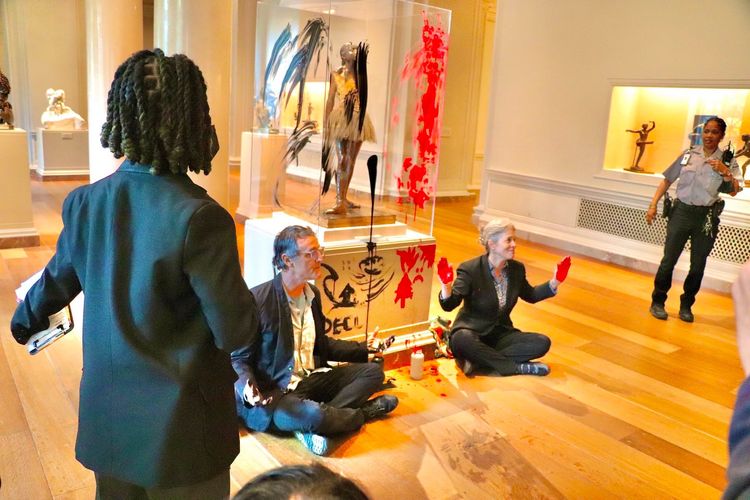Moving Fast & Breaking Shit
Can Silicon Valley Really Save the World?
By Amy Westervelt
In today's podcast episode we bring back one of our favorite guests, Maddie Stone, to talk about the intersection of tech and climate...through the lens of the HBO series Silicon Valley, which Mary has been pandemic-bingeing. There are some recurring themes both in this episode and in how we see the tech industry grapple with climate in public. That includes how much industry leaders conflate intentions with outcomes, their view of themselves as saviors of the world, and the idea not only that all innovation is good, but that they have no responsibility to the world other than innovating and that what happens with their innovation is not their responsibility or their problem.
As Maddie puts it, "These companies present themselves as innovators, but not as the deciders of how that innovation gets used. So they kind of put themselves on a pedestal of, 'We're just these really smart folks who are going to create tools and then because we live in a capitalist society and we love capitalism, we're not going to make decisions about who gets to use those tools. We're just going to bring brilliant people together to create them. And then hopefully they'll be used by the right people to make the world a better place."
It was a timely conversation given how many tech leaders have recently decided they're gonna go ahead and solve the climate change problem. But they’ve been saying that for a while now.
Reading List:
- Computer-Aided Destruction, by Maddie Stone for Drilled
- The Battle of Thacker Pass, by Maddie Stone for Grist
- Lobbying for Good? New campaign asks Big Tech to push for bold climate action, by Maddie Stone for Grist
- Tesla's new batteries might be harder on the environment than you think, by Amy Westervelt for The Guardian
- What Do We Do with All of Tesla's Batteries? by Amy Westervelt for KUNR
- Big Oil, Big Profits, Big Brother, by Maddie Stone for Drilled
- How Google, Amazon, and Big Tech Are Automating the Climate Crisis, by Brian Merchant for Gizmodo
- Amazon Is Aggressively Pursuing Oil as it Stalls Out on Clean Energy, by Brian Merchant for Gizmodo
- Tesla accused of environmental rule violations in US and Germany, by Lora Kolodny for CNBC
In Defense of Online
By Mary Annaïse Heglar
Something that happens when you have a moderate social media following or other type of digital platform, is that the people who follow you will accuse you of being “too online” in an effort to discredit you. They’ll tell you that you need to get outside and dance, or that you need to organize your neighbors, or call your representatives, or engage in some other type of activism that they have deemed more impactful. It happens to me and Amy all the time. It may or may not happen to us more because we’re women, but I definitely know it happens to just about anyone I know with a following.
It’s ridiculous for a million reasons. Here’s a few:
- You have no idea what we do offline. You see what we show you, and we don’t have to show you everything. Just because I do a lot of work online doesn’t mean I don’t do any offline. It doesn’t mean that I’m not minimizing my own carbon-intensive activities or that I don’t call my representatives or participate in in-person actions or mentor youth activists.
- Twitter is easy for some of us. I can tweet while waiting on the bus or in the doctor’s office. It doesn't take a lot of time or thought. It’s just 240 characters—it’s not rocket science. But that’s because I’m a writer and words come easily to me. That’s not true for everyone and it doesn’t make me better than anyone else, but it also doesn’t make me less than anyone else.
- What happens online actually does matter. You might think that since only a small portion of the general population is on Twitter, that Twitter “isn’t the real world.” But what happens online does not stay online. Not a single social movement—for good or bad—in recent memory did not have a significant online element: from the Capitol insurrection to the Rohingya genocide to the Defund Police and Abolish Ice movements. Interestingly, the very same people who dismiss social media as illegitimate are the first to tout its negative impacts. Well, it can’t be both frivolous AND corrosive. Pick a lane!
- Words matter. Like it or not, our discourse lives online now. More than anywhere else, it’s shaped on Twitter. The conversations and even the “fights” and “draggings” that happen there wind up changing the national conversation and influencing policy. It’s where we get to challenge the ideas of the status quo, redefine what’s possible, and normalize new ideas. Before you write it off, remember that the generation before you did the same with television and the generation before that did the same with radio. People were even hostile to books as a new technology that replaced in-person lectures. Online is here to stay and a lot of good can be done there.
Surprise: Natural Gas Is Really Not Much Better than Coal
By Amy Westervelt
Back in the early 2000s, even the big green groups thought of natural gas as a "bridge fuel" to renewables. It would hasten the transition away from coal, deliver short-term carbon dioxide emissions reductions, and buy us time to ramp up renewables. They ignored the fact that fossil fuel execs are the last people you'd ever expect to build something they're going to dismantle in 20 years, or that methane is also a potent greenhouse gas. Now it seems every few months there's a new study that reveals that natural gas is worse than we ever imagined . On top of contributing more to climate change than previously thought, it has poisoned groundwater, created enormous amounts of radioactive waste (yes, radioactive), and it hasn't even delivered any lasting economic benefit.
A new study coming out this week from Harvard University highlights another overlooked impact: air pollution. The researchers found that the "the total health impacts of gas surpass that of coal in 19 states." The expectation was that getting rid of coal would deliver immediate air quality benefits, but in fact pollution levels have remained constant. That's because coal was replaced by a combination of natural gas and another climate boondoggle once embraced by green groups and now rejected: biomass, the burning of wood and mulch for energy. And it turns out those two combined are polluting the air as much or in some places more than coal ever did. Fantastic!
These are the things I think about any time someone seems a little too excited about this or that climate "solution." The system that delivered catastrophic climate change to us is the same one these solutions are being proposed in, it is a system driven largely by money and power, in which a select few get to pick "solutions" for the rest of us. What's even wilder about the embrace of natural gas and biomass is that they don't make sense on any level: they don't deliver long-term climate gains or short-term environmental benefits or economic benefits (except for a select few).
This is why Mary and I hammer on so much about needing to understand the true drivers of climate change, the root causes, before we fully embrace any particular technological or political solution. We've seen for decades the results of failing to do so: repeatedly embracing policies and technologies that do not, in fact, solve the problem. Half the time, they aren’t even band-aids. A solution that causes more problems is not a solution.
Big Boat Still Stuck — In Yemen
By Mary Annaïse Heglar
I’ve written in this newsletter before about the impending disaster off the coast of Yemen in the form of a corroding oil tanker named Safer. Basically, there is a very old, very big oil tanker off the coast of a war-torn country that is slowly but surely sinking into the Red Sea. If nothing is done, the consequences will be catastrophic—it would eclipse the Exxon Valdez spill, widely considered the most ecologically damaging oil spill in world history. When the story broke in Gizmodo in December, the plan was for the UN to send in experts to evaluate the tanker and come up with a plan to ward off disaster.
To this day, those experts have not made it onto the tanker, and each day lost is a precious one. Instead, the tanker has become something of a bargaining chip in an ongoing civil war with many, many sides. As ominous and precarious as this situation is, though, it’s barely getting any attention. The stuck boat in the Suez Canal took over Twitter and dominated headlines for at least a week, but this one is barely a blip on the radar. We all know that we don’t solve problems we don’t talk about. And we need to talk about this one.
Week in Greentrolling: Shell and Chevron Made Money
By Amy Westervelt and Mary Annaïse Heglar
This week, Shell and Chevron want you to know that they made money in this first quarter of 2021. So, thanks in part to both pandemic subsidies and regular ol' subsidies and tax breaks, an industry that saw an unprecedented drop in demand for its product is doing just fine. They're rebounding faster than any other industry. And, in fact, the oil majors were able to use the pandemic as an opportunity to pick up smaller producers on the cheap (as Chevron did, feeding off the carcass of fracking pioneer Noble Energy).
Thing is, their calculation of their profits, much like their calculation of their greenhouse gas emissions, is incomplete. They’re not including the costs of the 2020 hurricane season or the coming 2021 hurricane season, which scientists considered starting as early as this month. It doesn't include the Southern ice storm from earlier this year or the fires in the West Coast and Australia last year. It doesn't include the billions of dollars cities and states are spending to try to build sea walls or prepare for increasingly devastating fire seasons. It also doesn’t account for the still ongoing pollution of the Ecuadorian Amazon that Chevron refuses to clean up.
Basically, their profit is everyone’s loss.
The Week in Climate Coverage
Rising Temperatures, Rising Seas
Is your home in a flood-prone zone? You may find out the hard way, by Jena Brooker for Grist
The 7 climate tipping points that could change the world forever, by Alexandria Herr, Shannon Osaka, & Maddie Stone for Grist
Sea Level Rise Driven by Crucial Ice Sheet Could Be 30% Higher, by Molly Taft for Earther
Glaciers Are Melting Faster, Declassified Satellite Images Show, by Dharna Noor for Earther
The giant accounting problem that could hamper the world’s push to cut emissions, by Chris Mooney and Brady Dennis for The Washington Post
‘Firefighters Out There in the Snow’: Wildfires Rage Early in Parched West, by Simon Romero for The New York Times
As glaciers disappear in Alaska, the rest of the world’s ice follows, by Jonathan Watts for The Guardian
Brazilian Amazon released more carbon than it absorbed over past 10 years, by Agence France-Presse for The Guardian
In his first 100 days, how has Biden handled the four crises he outlined? By David Smitha and Daniel Strauss in The Guardian
Speed at which world’s glaciers are melting has doubled in 20 years, by Jonathan Watts and Niko Kommenda for The Guardian
The Climate Presidency
Biden’s 100-Day Honeymoon With the Climate Left Is Coming to an End, by Kate Aronoff for The New Republic
Joe Biden Wants to Transform Care Work in America, by Mike Konczal for The Nation
Biden's climate mantra? 'Jobs, jobs, jobs,' by Ysabelle Kempe for Grist
Biden’s new moonshot: An offshore wind industry to rival Europe’s, by Derrick Z. Jackson for Grist
Biden’s quiet plan to prepare the US for the health impacts of climate change, by Zoya Teirstein for Grist
Senate Reinstates Obama-Era Regulations on Methane, by Coral Davenport for the New York Times
Biden’s Climate Summit Sets Up a Bigger Test of American Power, by Somini Sengupta for the New York Times
How Biden could actually deliver on his climate goals, by Rebecca Leber for Vox
Biden climate plan: Should anyone care about America's new pledge? by David Roberts for Vox
Senate votes to restore Obama-era limits on methane gas emissions, by Tik Root, Juliet Eilperin, and Brady Dennis for The Washington Post
Senate Passes $35 Billion Water Bill, but Bigger Infrastructure Fights Loom, by Emily Cochrane for The New York Times
Can the U.S. Win Back Its Climate Credibility? Featuring Coral Davenport, for the New York Times
‘Life support’ measures could buy Great Barrier Reef another two decades, study finds, by Graham Readfearn for The Guardian
Climate Accountability
A New Study Shows Why Fracking Has to Stop, by Kate Aronoff for the New Republic
New York's landmark climate bill still lacks funding after two years, by Lee Harris for Grist
The fossil fuel industry isn’t sweating Biden's climate plans ... yet, by Emily Pontecorvo & Shannon Osaka for Grist
After a decade of failures, Washington state passes a cap on carbon emissions, by Kate Yoder for Grist
California's Carbon Offset Program Is a Complete Disaster, by Molly Taft for Earther
The Case to End Methane Emissions This Decade, by Dharna Noor for Earther
Federal court rules EPA must ban pesticide linked to harm in children – or prove it is safe, by Brady Dennis for The Washington Post
‘Everyone Loses’: The Government Is Rationing Water at the California-Oregon Border, by Madeleine Gregory for Vice
In Opposing Climate and Diversity Proposals, Buffett Risks Looking Out of Step, by Michael J. de la Merced for The New York Times
Facing Droughts, California Challenges Nestlé Over Water Use, by Jacey Fortin for The New York Times
Glimmers of Hope
Countries Might Actually Hit Their Climate Targets. Really! By Geoff Dembicki for Vice
Swift action to cut methane emissions could slow Earth’s warming by 30 percent, study finds, by Brady Dennis and Steven Mufson for The Washington Post
Hawaii becomes the first US state to declare a climate emergency, by Kate Yoder for Grist
California plans to phase out all oil and gas production by 2045, by Alexandria Herr for Grist
Climate Youth Win Landmark Victory in Germany's Top Court, by Molly Taft for Earther
German High Court Hands Youth a Victory in Climate Change Fight, by Melissa Eddy for The New York Times
Dare we hope? Here’s my cautious case for climate optimism, by Rebecca Solnit for The Guardian
Barcelona installs Spain’s first solar energy pavement, by Stephen Burgen for The Guardian
Justice Is Justice Is Justice
Deadly air pollutant ‘disproportionately and systematically’ harms Americans of color, study finds, by Juiet Eilperin and Darryl Fears for The Washington Post
Montana Set to Pass Extreme Anti-Pipeline Protest Law, by Brian Kahn for Earther
Majority of Air Pollution Hurts Communities of Color More, by Dharna Noor for Earther
Illustration for How Climate Policy Can Combat Extreme Poverty, by Dharna Noor for Earther
People of Color Are Exposed to More Pollution, by Hiroko Tabuchi and Nadja Popovich for the New York Times
The Pandemic Exposed the Severe Water Insecurity Faced by Southwestern Tribes, by Judy Fahys for InsideClimate News
EPA, U.S. Virgin Islands officials launch probe after second St. Croix refinery accident, by Juliet Eilperin and Darryl Fears for The Washington Post
Tesla’s Latest Solar Stumble Big Price Increases, by Ivan Penn for The New York Times
Climate in Culture
Epicurious Has a Beef With Beef, by Derrick Bryson Taylor and Christina Morales for The New York Times
A Climate Scientist Explains Why It’s Still Okay to Have Kids, by Sigal Samuel for Vox
There Is No War on Meat. There Should Be, by Nick Martin for The New Republic
Seaweed Clothes Can Save the Planet, by Vice News
The Departed Could Soon Become Compost in Colorado, by Bryan Pietsch for The New York Times
Climate activist arrested after gluing himself to Westminster Bridge, by Clea Skopeliti for The Guardian
‘Time to shake things up’: music industry confronts climate crisis as gigs resume, by Adam Corner for The Guardian
Plus More
Should I give up dairy because of climate change? by Eve Andrews for Grist
Nine fires were started in the Everglades in two months. Federal authorities want to know who caused them, by Paulina Firozi for The Washington Post
Joanne Chory is using plants to save the planet, by Sarah Kaplan for The Washington Post
Surreal Photos of an ‘Underground Temple’ That Keeps Tokyo From Flooding, by Hanako Montgomery for Vice
What Covid and Clear Skies Meant to Drinking Water for 300 Million, by Henry Fountain for The New York Times
This Is the End of Nuclear Energy in New York, by Patrick McGeehan for The New York Times
Where Does a Candle Go When It Burns? By Randall Munroe for The New York Times
Jamaal Bowman Explains How Progressives Will Make Biden’s Presidency Even Bolder, by John Nichols for The Nation
P.S. Why can you never trust atoms?
They make up everything!





Only paid subscribers can comment.
Please subscribe or sign in to join the conversation.